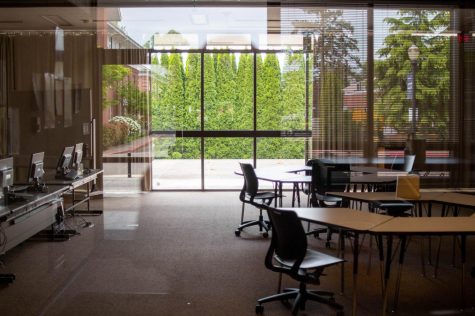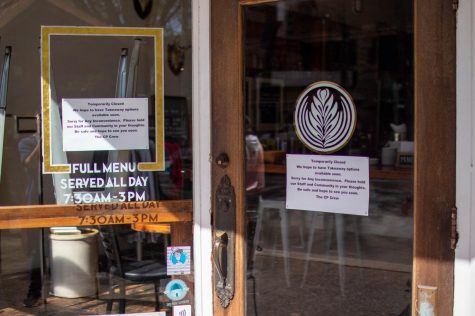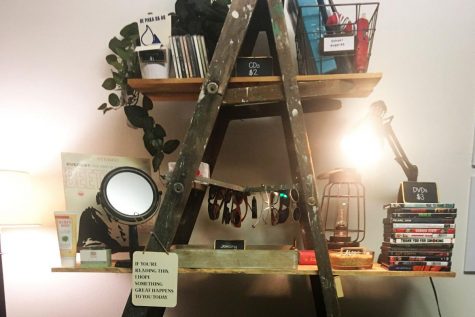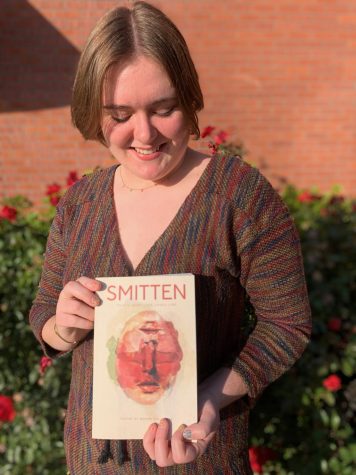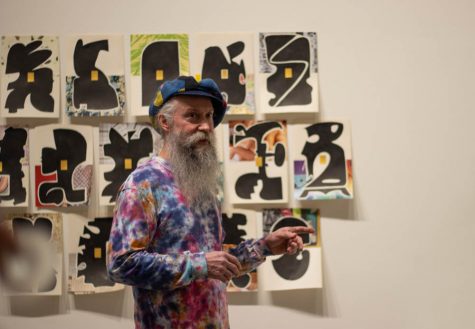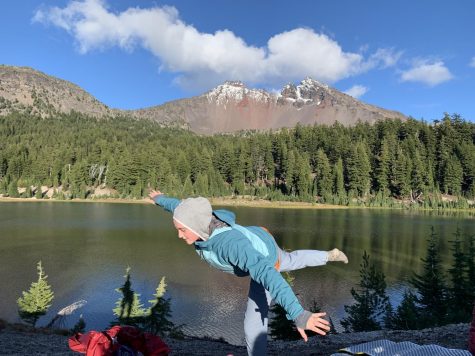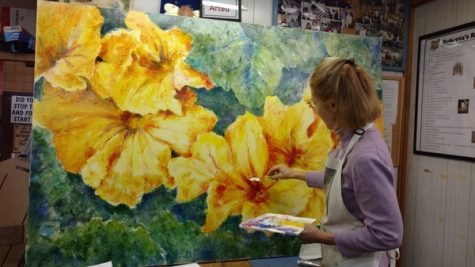‘Why Nepal? Why Bhutan?’
February 23, 2015
“It would take a really long time to tell you all of what I came away with from this trip,” senior Rachel Axtman said, who then went on to articulate that one of the most important things she had learned while abroad this January was, “A better sense of the great variance of what peopleneed to be happy.”
Axtman was one of the nine Linfield students who had the privilege of spending their 2015 January term studying abroad in Nepal and Bhutan.
Axtman was initially inspired to go on this trip because of the rare opportunity to hike in the Himalayas.
“But the more I learned about that area of the world, the more curious I became about how people live, what they believe and how they view themselves and their place in the world,” Axtman said.
The studies that students focused on over the course of this trip revolved primarily around how people understand themselves and the world around them through religion and their philosophical understandings.
“Religion in Nepal and Bhutan is such a fundamental part of most people’s daily lives, and it is at the core of many individual’s understanding of how the world works,” Axtman said.
Senior philosophy major Gabe Wells has a great passion for the subject matter that revolved around this trip.
“In the U.S., philosophic academia revolves mostly around Western thought,” Wells said. “The Eastern schools of thought such as Buddhist scripture are often put aside and not included in discussion.”
Wells has previously taken an Eastern philosophy class that opened up ways of thinking he had never been exposed to.
“This trip was sort of a way to cement my passions for this material,” Wells said. “Even though it was only a month, it was profound enough and it was impactful enough that I’ve continued studying the subject matter on my own time outside of any classes.”
Professor of Religious Studies Dave Fiordalis was one of the Linfield faculty members who lead the trip to Nepal and Bhutan, along with co-leader
Professor of Philosophy Kaarina Beam.
Fiordalis first visited Nepal in January 1997.
“I spent about a month there on vacation while I was living and studying in India,” Fiordalis said. “I fell in love with the majesty of the Himalayan Mountains and became fascinated with the people who live among them and have for millennia.”
In 2010-2011, Fiordalis had an opportunity to move back to Nepal with his family, wife and infant daughter, to teach Sanskrit, Tibetan and Buddhist studies for a year at Kathmandu University.
“That was just before I came to Linfield,” Fiordalis said. “So, I have a long history with and some fairly recent first-hand knowledge of the region.”
In general, Fiordalis’ scholarly expertise is in South Asian and Himalayan religions and cultures, and he is passionate about introducing students to that part of the world.
“However, the driving force behind this trip was Kaarina Beam,” Fiordalis said. “She has a burgeoning interest in Bhutan, particularly in their education system and how it does or does not help to support the new democratic political system in the country.”
Beam had previously led several Jan-term trips to China, but she did not have any first-hand experience in Nepal or Bhutan, so her and Fiordalis agreed to teach this course together.
“Nepal is a natural comparison to Bhutan, since they share similar geographies and other characteristics, and Nepal is also emerging as a new democracy in the region at the present time,” Fiordalis said. “We were interested to witness the lived realities of people in the two countries at the present time.”
Senior Connor Wicknick took great interest in the realization of just how much goes on in the countries of Nepal and Bhutan that the group did not get to see.
“It was really interesting as we went about our daily business to think about all the other things going on besides just you,” Wicknick said. “It sort of feels like you’re in a huge pool of water, just left suspended in the middle while all this other stuff happens around you.”
Fiordalis believes that one of the most important things Americans can do is travel abroad during college.
“I think it is particularly valuable to spend significant time in countries like Nepal or Bhutan or other countries with developing economies and underdeveloped infrastructures,” Fiordalis said. “My trips to India and Nepal during my own college years were some of the most formative experiences of my life. They truly set me on my life’s path in many ways.”
Many of the students who embarked on this trip with Fiordalis and Beam feel they have been changed as a result.
“I definitely have a greater appreciation for everything I have access to here, and at the same time realize that sometimes simplicity is key in life,” senior Zoë Erikson said. “I came away with an understanding that happiness is different for everyone everywhere in the world. What one person needs to be happy can be completely different across cultures, and that is okay.”
In contrast, Axtman does feel that she has necessarily changed vastly through this experience, but feels as though she has gained an added sense of awareness and a new idea of what comfort means to her.
“We come from an incredible place of power and privilege here, and when you’re taken out of that and forced to face it more directly than you do in your day-to-day here in the bubble of Linfield, it’s a really good thing,” Axtman said.
While some aspects of the trip were emotionally challenging for the group, the experiences they came away with made it all the more rewarding.
“It was crazy feeling so far away, but at the same time you feel like you’re at home everywhere,” Wicknick said. “People all over the place were so welcoming and happy to have us in their homes and teach us their culture. They know you don’t know anything about it and that we have to rely on them to figure out how to live there.”
Much of the time during this trip, the group was housed in a hotel and most of the things that they classify as ‘needs’ were met.
But there was a period of about five days that the group trekked through the mountains in Bhutan that brought about very contrasting conditions.
“The day alternated from high hear during the day, as we were high up in the mountains and close to direct sun, to the evening time when temperatures were down in the 20’s,” Wells said.
Erikson’s fondest experiences from the trip revolved around the physicality of the countries.
“My favorite experience was definitely hiking up to the Tiger’s Nest in Bhutan,” Erikson said. “The view was beautiful and we had the opportunity to go into the monastery to meditate.”
Not only did the group engage in different physical adventures abroad, but they also were exposed to countless spiritually enlightening experiences.
“There were several moments when I just felt some sense of emotional awe and wonderment in many of the temples and monuments we visited that were over 1000 years old,” Wells said. “I was taken aback by the sense of magic that they had.”
For Axtman, the most inspiring experiences came not from places, but from the people she met.
“It was really the conversations I had with people that changed my perspectives the most,” Axtman said. “Hearing how people think democracy is, or isn’t taking shape in Nepal, and getting their views on gender, monarchy, poverty, wealth, education, and religion were the most valuable things to come away with.”
The people of Nepal and Bhutan played a large part in shaping the group’s overall experience, but they also found companionship in what turned out to be a very special canine friend.
“We met this dog who slept by our fire after one of our long days hiking in Bhutan,” Wicknick said. “She was just this golden fluff ball of calmness and love. She ended up following us for the next few long days of hiking. She didn’t leave us for a second.”
The group formed an intense bond with this dog; almost like she was there to protect them.
“She was kind of like our spirit guide in a way,” Wells said. “She refused to leave us alone and followed us through mountains, valleys and jungles.”
Eventually the group had to leave the stray dog behind, but they found a perfect home for her with a mother and daughter who agreed to take her and look after her.
“We had to tie her up so she wouldn’t follow us as we left,” Wicknick said.
The dog clearly did not want to separate from the group.
“It was really hard to listen to her whimper and beg us not to leave,” Wells said. “She was sad… we were too.”
Words that the students used to describe being in Nepal and Bhutan included ‘raw,’ ‘unfiltered,’ ‘colorful,’ ‘complex,’ and ‘multi layered.’
“Every building looks like it’s got a thousand years of history on it,” Wells said. “It drastically widened my world perspective. It was unlike anything I’ve ever seen.”
Though this trip was only a month long, every single thing that this group was able to do in that month was nothing short of astounding.
“I went into this trip with the desire to be changed for the better,” Wells said. “The mind, once expanded, cannot return to its original dimensions.”
Erikson wants to encourage the younger Linfield population to take advantage of the programs here and travel, even if it means stepping outside your comfort zone.
“It’s definitely worth it,” Erikson said. “Even though they weren’t always easy, the experiences were incredible.”
As the group trailed through mountains and the temples, they each went through their own self-growth and expansion.
“What I came away with was very worthwhile and something I’m really excited about,” Wells said.



